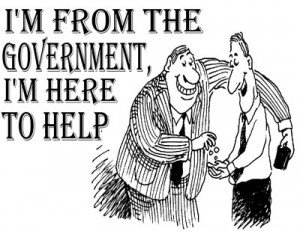Government Promises Lead to Economic Dark Age
It is impossible to grow our way out of this hole. Arithmetic, rather than economics or politics, dictates the two options! The Ponzi scheme known as the democratic welfare state has run its course. Only its obituary is left to write.
From Monty Pelerin’s World
The US government believes that the Social Security and Medicare promises are not legal liabilities. The rationale, as stated by the Government, is that the government has the right to alter (or eliminate) these obligations at their sole discretion.
are not legal liabilities. The rationale, as stated by the Government, is that the government has the right to alter (or eliminate) these obligations at their sole discretion.
This rationale provides the basis for not showing these social obligations as liabilities in federal accounting reports. That enables the government to report debt in the range of $15 Trillion (the funded debt), ignoring the $100 Trillion estimated to be the present value of the future liabilities of these programs.
It is a convenient interpretation for the political class whose natural tendency is to avoid problems by hiding them and/or deferring them for another generation. How natural it must be for legislators, primarily attorneys, to think of all problems in legal terms. “If it is not illegal, it must be OK” seems to be the ethical code of Washington. Most of us don’t believe that illegality is even considered a constraint by government these days.
But legal and economic concepts are quite different. A lease, in the eyes of the law, does not transfer ownership in any legal sense. From an economic standpoint, however, ownership rests with the person who controls the use of property. This is true regardless of who holds the title, at least during the term and subject to the restrictions of the lease. The law says the lessor is the owner, reality says the lessee.
Promises or commitments made by the Federal Government might technically be deemed not legally binding by clever attorneys or courts of law. Yet millions of Americans understand they have a contract with their government. That contract has both economic and moral implications. Citizens planned their lives around the validity of these commitments. Most depend upon them for retirement, or will.
Two other governmental arrangements represent implicit promises that will be tough to abrogate:
- Entitlements, of which welfare is the most important. The government provided most entitlements with few qualifying requirements. A significant portion of society now depends upon them. For some, they represent normalcy; a lifestyle choice that does not involve labor. This “normalcy” has been a way of life for several generations. Such a “life-choice” has left these families relatively vulnerable, at least in terms of having meaningful work skills.
- Government employment. Government employees are accustomed to job security, great benefits, high pensions and high wages. Like entitlements, these emoluments are considered normal and sacrosanct. They will not easily be relinquished, especially where public employees have been unionized.
While neither constitutes a true legal obligation, each has been explicitly or implicitly promised by our Federal Government. The recipients have been conditioned to these “entitlements.” Each has affected the life-style and life-planning of the beneficiaries. They will not be easily removed.
If the US Government attempts to renege, there will be strife. Hustlers may be able to use lack of ethics or legal loopholes to escape obligations, but the government may not be so fortunate. The difficulty arises not because the government is in any manner more honorable than a common thief, but because masses of people based their lives on these promises. The masses greatly outnumber the politicians, the police and the court system.
To remove any of these “benefits,” “obligations” or “entitlements” (depending upon your viewpoint) will not be easy. Such attempts will produce greater violence than experienced in Greece. Ilana Mercer agrees in an interesting article on this subject:
The Grecian wilding is a minor event compared to the events that’ll unfold should China quit funding our federal behemoth’s bacchanalia, and the Moody’s credit-rating agency downgrade U.S. Treasuries to junk bond status, befitting a banana republic.
The sound and fury of Andy Stern’s Service Employees International Union, in it millions, will be like Tyrannosaurus (T-Rex) tearing through Jurassic Park.
I disagree with Ms. Mercer’s use of “should” with respect to China. It would be more accurate to say “when.” China is probably the next big bubble and already has had debt auctions fail. Their problems (and opportunities) are too immense for them to continue to support the profligate US. Similar comments apply to the rest of the world’s ability or willingness to support the US.
The US cannot continue its Blanche du Bois role. Our ability to “depend upon the kindness of strangers” is about over. We are now, or shortly will be, on our own. ”Strangers” are no longer going to support our lifestyle or our government deficits.
The US government has been reduced to two choices. Neither is pleasant. It can address its commitments by dramatically reducing or eliminating them. Or, it can print money in order to continue to meet its obligations. Obviously these choices are not mutually exclusive. A combination could be pursued.
The first choice produces a Greece-like civil unrest, likely on a more violent scale. The second leads to hyperinflation, the destruction of the dollar and the collapse of the economy. The second also produces violence when the economy implodes.
 There are no other alternatives. It is impossible to grow our way out of this hole. Arithmetic, rather than economics or politics, dictates the two options! The Ponzi scheme known as the democratic welfare state has run its course. Only its obituary is left to write.
There are no other alternatives. It is impossible to grow our way out of this hole. Arithmetic, rather than economics or politics, dictates the two options! The Ponzi scheme known as the democratic welfare state has run its course. Only its obituary is left to write.
What happens depends upon political choices. No organization can force the US government to cut back like the EU is trying to do with Greece. We are dependent upon our own politicians. The universal character of all politicians is dominated by cowardice. That is why I believe that no remedial action will be forthcoming to solve the problems. Procrastination descends into the hyperinflationary alternative.
At some point, we will rebuild from the economic ashes. Hopefully our form of government (preferably with a new cast of characters) survives the chaos and the transition period is short-lived.
“Monty Pelerin” is a pseudonym derived from The Mont Pelerin Society. Friedrich Hayek, Nobel laureate in Economics in 1974, was the founder of the group. The site has no connection to the Mont Pelerin Society other than a coincidence in philosophy.
Help Make A Difference By Sharing These Articles On Facebook, Twitter And Elsewhere:
